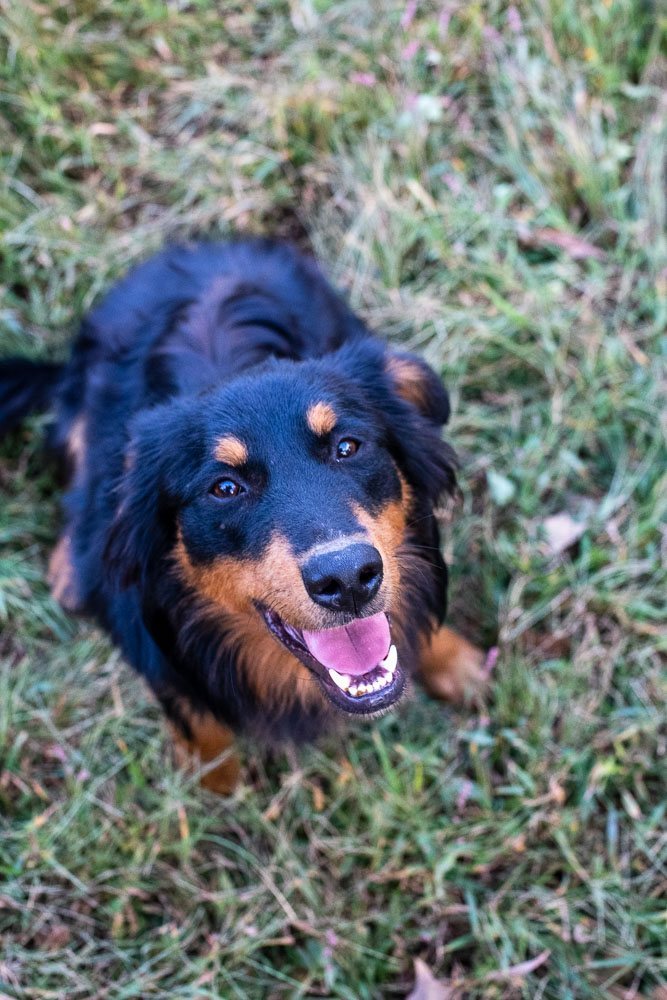Abstract
This guide provides a step-by-step approach to using differential reinforcement of incompatible behaviors (DRI) to train dogs to stop jumping on visitors. By teaching and reinforcing an incompatible behavior, such as sitting, owners can effectively reduce unwanted behaviors in their dogs. Consistency, patience, and practice are essential in achieving success with this training method.
Dog Situation
The English Shepherd dog, Rex, has a habit of jumping on visitors when they enter the house. This behavior is unwanted and causes discomfort to both the guests and the dog’s owner. The owner seeks a solution to effectively train Rex to stop jumping on people.
Dog Behavior
Rex becomes excited when visitors arrive and expresses this excitement by jumping on them, seeking attention and interaction. This behavior is problematic as it can lead to injury, damage to clothing, or even cause fear in some guests.
Trainer’s Recommendations
The trainer suggests using differential reinforcement of incompatible behaviors (DRI) as a technique to modify Rex’s behavior. By teaching Rex to sit when visitors enter the house, the trainer aims to replace the unwanted jumping behavior with a more desirable and controlled response. The trainer emphasizes the importance of consistency, patience, and practice throughout the training process.
How To Stop Your Dog from Jumping on Visitors
- Identify the target behavior
In this case, the target behavior is jumping on visitors, which we want to eliminate.
- Identify an incompatible behavior
The incompatible behavior should be something that the dog cannot perform simultaneously with the unwanted behavior. In this case, sitting is incompatible with jumping on visitors.
- Choose a reinforcer
Identify a positive reinforcer that will be used to reward the incompatible behavior. This can be treats, praise, or even playtime.
- Set up the training environment
Ensure that the training environment is safe and controlled. You can start with a quiet room where the dog is less likely to be distracted.
- Teach the incompatible behavior
Begin by teaching Rex to sit on command. Use the chosen reinforcer (e.g., a treat) to reward Rex every time he sits on command. Repeat this process until Rex consistently responds to the “sit” command.
- Apply DRI during training sessions with visitors
Have a friend or family member act as a visitor. As the “visitor” approaches, give Rex the “sit” command. When Rex sits, reinforce the behavior with the chosen reward. If Rex jumps on the visitor instead, do not provide any attention or reinforcement. If necessary, calmly remove Rex from the situation and try again.
- Gradually increase the difficulty
As Rex becomes more successful with sitting when visitors approach, gradually increase the difficulty by adding more distractions or having the visitors enter the house more excitedly. Continue reinforcing the sitting behavior while ignoring any instances of jumping.
- Maintain consistency and patience
Training a dog using DRI requires consistency and patience. It’s essential to practice regularly, reinforce the incompatible behavior, and avoid reinforcing the unwanted behavior. Over time, Rex should become more likely to sit rather than jump on visitors.
- Generalize the behavior
Once Rex consistently sits when visitors enter the house, practice in different environments and with various visitors to help Rex generalize the behavior.
- Gradually face the reinforcement
Once Rex demonstrates the desired behavior consistently, gradually fade out the use of treats or other reinforcers while still providing praise and occasional reinforcement to maintain the learned behavior.
Results/Consequences
After implementing the DRI technique, Rex gradually learns to sit instead of jumping when visitors arrive. This new behavior not only reduces the chances of injury or discomfort to guests, but also allows for a more pleasant and controlled interaction between the dog and the visitors. The owner and guests are more at ease, and Rex receives positive reinforcement for displaying appropriate behavior, ultimately creating a harmonious environment for all involved.
Read More
- Pryor, K. (1999). Don’t Shoot the Dog!: The New Art of Teaching and Training. Bantam Books.
- Chance, P. (2013). Learning and Behavior. Wadsworth Cengage Learning.
- Reid, P. (1996). Excel-Erated Learning: Explaining in Plain English How Dogs Learn and How Best to Teach Them. James & Kenneth Publishers.
- Miltenberger, R. G. (2012). Behavior Modification: Principles and Procedures. Wadsworth Cengage Learning.

